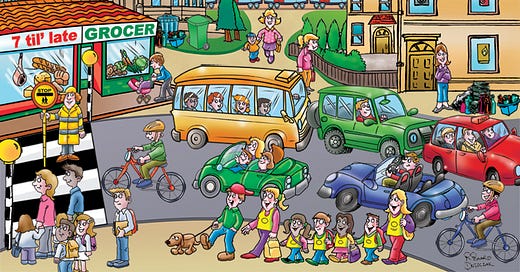Rejecting over-stimulation and making a philosophy out of sitting still
Maybe that’s just Stoicism but whatever
I went on a run without headphones. No music, no podcast, no audiobook. I think there’s something to be said for hearing yourself breathe.
And really, for hearing yourself think.
My question, or my favorite thing to rant about as of late, has been centered on the idea of returning to humanhood. In an era where we rely on devices and all knowing chatbots, where we’re ruled by lizard people, and where our lives seem bound to constant screen-staring, I’ve been trying to push myself in the opposite direction. Admittedly, it’s been a challenge.
We subject ourselves to constant and incessant stimulation. We spend every waking hour wired. And for all the memes about iPad Babies, it can be hard to differentiate between the full scale tantrum grown adults fall into when there’s no functioning WiFi.
We’ve lost the ancestral practices --no, the ancestral feelings-- of being human. What I mean is, we’ve forgotten how to be okay with being nothing.
In the decade and a half since the Smartphone has become our default, we’ve developed dependencies on constant audio stimulation, plugging our ears up with headphones at all hours of the day. We’ve developed postures that keep our necks perpetually bent as we stare down endless holes of content. It doesn’t even strike us as unnatural either. That’s how fast it all happened.
A return to humanhood isn’t so much about doing more of something than it is about doing less. It’s a return to our collective ability to sit in silence and allow ourselves to be and to breathe, as the default rather than the intention. The summer 2024 trend of “raw-dogging” a plane ride -- staring ahead, not using any in-flight entertainment, napping, or eating packaged peanuts -- took the form of a relatively innocuous display of masculinity. Men showed their ability to not do anything as a testament to their mental fortitude.
But it’s not like we don’t do this every day. We just don’t recognize it as such.
People always say they’re more creative in the shower. And maybe there is some link between relaxation, warm water, and white noise. But I’d guess that it has more to do with being alone, standing still, and not really focusing on doing anything else, than the magical properties of routine hygiene. Here, our minds are allowed to wander.
When we constantly bombard ourselves with distraction, we drown ourselves out.
It’s like we’re scared to be alone with our thoughts -- whether our thoughts are scary, or we’re scared that we don’t have any thoughts at all.
If anything, the anxiety of being alone with oneself is the most glaring signal that one should be alone with oneself. Our stream of consciousness is the only thing we can ever truly be certain of; when we can’t confront it, we get further and further away from ourselves.
Complaints about the death of critical thinking might soon become complaints about the death of thought alone. It seems like nobody can form their own opinions anymore unless a political party or an algorithm tells them first. There’s hundreds of thinkpieces floating around about the death of personal style. How long until this becomes the death of personality itself?
When we consume the same content, we create an echo chamber in which the broader culture is constrained to an increasingly homogenized subsect of Western white womanhood, where there’s no real, genuine challenge to anything defined outside of orthodoxy. We erase individuality, and choke out anything that has ever made anyone interesting.
These great pieces of art, these important cultural touchpoints, have only come about because someone had decided to produce something original, and therefore worthwhile. And this can’t happen unless anyone gives themselves the time to think.
I’m not saying that once we have modern conveniences we shouldn’t use them. Headaches are ancestral feelings too, but I would never deny myself an ibuprofen or two. For that matter, I can’t tell you the last time I did long division, or woke up on time for work without an alarm clock, and I probably couldn’t make a fire if you handed me the lighter fluid; but what I do have is my brain.
All the chatter about the end of days and AI replacement theory seems to leave out one crucial point of culpability: we put ourselves in danger when we relinquish the power we have over our minds. When we don’t resist the “brainrot” -- when we relish in it, and find community with others who are “chronically online” -- we throw up our hands. We say, here: dominate me.
You have agency. You have the ability to let yourself be.
You want to be radical? Be human.





another Bella Ve HIT!!